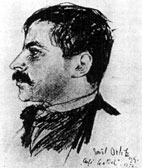- Jakob Wassermann
Infobox Person
name = Jakob Wassermann.jpg
image_size = 150px
caption = "Jakob Wassermann", by Emil Orlik
birth_name =
birth_date = birth date|1873|03|10
birth_place =Fürth
death_date = death date and age|1934|01|01|1873|03|10
death_place =
death_cause =
resting_place =
resting_place_coordinates =
residence =
nationality = German flagicon|Germany
other_names =
known_for =
education =
alma_mater =
employer =
occupation =
home_town =
title =
salary =
networth =
height =
weight =
term =
predecessor =
successor =
party =
boards =
religion =Jewish
spouse =
partner =
children =
parents =
relatives =
website =
footnotes =Jakob Wassermann (
March 10 ,1873 -January 1 ,1934 ) was aJew ish-German writer andnovelist .Life
Born in
Fürth , Wassermann was the son of a shopkeeper and lost his mother at an early age. He showed literary interest early and published various pieces in small newspapers. Because his father was reluctant to support his literary ambitions, he began a short-livedapprenticeship with a businessman inVienna after graduation.He completed his military service in
Nuremberg . Afterward, he stayed in southern Germany and inSwitzerland . In 1864 he moved toMunich . Here he worked as a secretary and later as acopy editor at the paper "Simplicissimus ". Around this time he also became acquainted with other writersRainer Maria Rilke ,Hugo von Hofmannsthal , andThomas Mann .In 1896 he released his first novel, "Melusine". Interestingly, his last name (Wassermann) means "water-man" in German; a "
Melusine " (or "Melusina") is a figure of European legends and folklore, a feminine spirit of fresh waters in sacred springs and rivers.From 1898 he was a theater critic in
Vienna . In 1901 he married Julie Speyer, whom he divorced in 1915. Three years later he was married again to Marta Karlweis.After 1906, he lived alternatively in Vienna or at "Altaussee in der Steiermark" where he died in 1934 after a severe illness.
In 1926, he was elected to the Prussian Academy of Art. He resigned in 1933, narrowly avoiding an expulsion by the
Nazis . In the same year, his books were banned in Germany owing to his Jewish ancestry.Wassermann's work includes poetry, essays, novels, and short stories. His most important works are considered the novel "Der Fall Maurizius" (1928) and the autobiography, "My Life as German and Jew" ("Mein Weg als Deutscher und Jude") (1921), in which he discussed the relationship between his German and Jewish identity.
Works
*"Melusine" (Novel, 1896)
*"The Dark Pilgrimage" ("Die Juden von Zirndorf") (Novel, 1897)
*"Die Geschichte der jungen Renate Fuchs" (Novel, 1900)
*"Der Moloch" (Novel, 1902)
*"Der niegeküsste Mund" (Stories, 1903)
*"Kunst der Erzählung" (Essay, 1904)
*"Alexander von Babylon" (Novel, 1905)
*"Caspar Hauser oder Die Trägheit des Herzens" (Novel, 1908)
*"Der Mann von vierzig Jahren" (Novel, 1913)
*"Das Gänsemännchen" (Novel, 1915)
*"Christian Wahnschaffe" (Novel, 1919)
*"Die Prinzessin Girnara, Weltspiel und Legende" (Play, 1919)
*"Mein Weg als Deutscher und Jude" (Autobiography, 1921)
*"Laudin und die Seinen" (Novel, 1925)
*"Das Gold von Caxamalca" (Stories, 1928)
*Novel Trilogy:
**"The Maurizius Case" ("Der Fall Maurizius") (1928)
**"Etzel Andergast" (1931)
**"Joseph Kerkhovens dritte Existenz" (1934)References
* John Carl Blankenagel: "The writings of Jakob Wassermann". Boston, The Christopher publishing house, 1942.
*Henry Miller : "Reflections on The Maurizius case: a humble appraisal of a great book". Santa Barbara, Calif.: Capra Press, 1974.
* Stephen H. Garrin: "The concept of justice in Jakob Wassermann’s trilogy". Bern: Lang, 1979.External links
*
Wikimedia Foundation. 2010.
